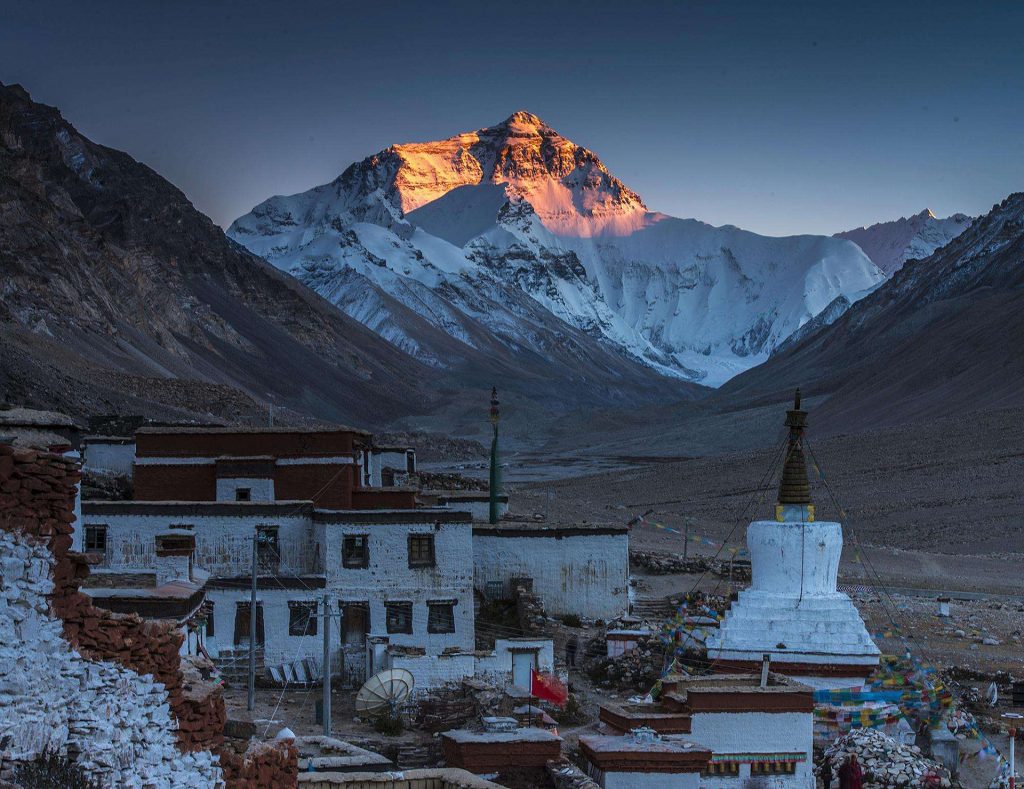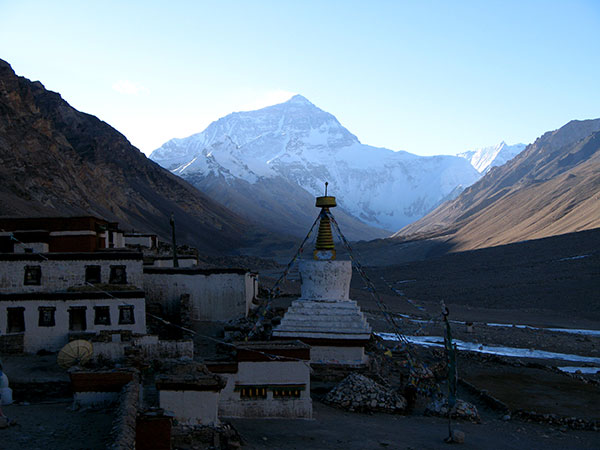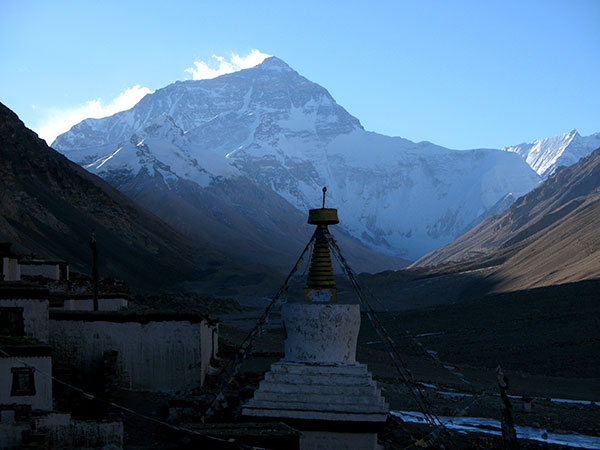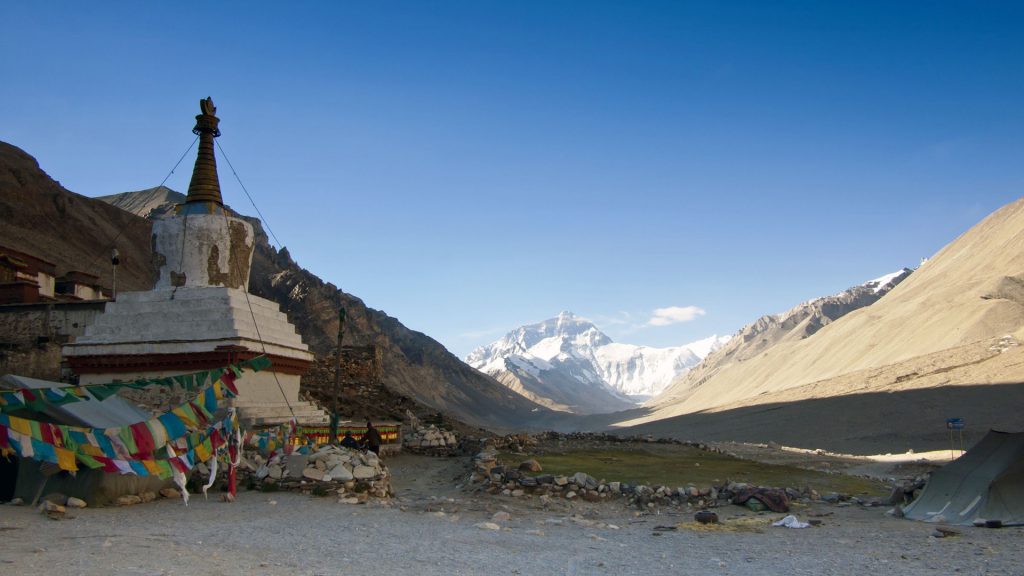Rongbuk Monastery was built by a local Lama in 1899. Because it is located at the north slope of the Mt. Everest, 5,154 m above the sea level. It is the base camp for mountaineers and an ideal location to view Mt. Everest from afar. Walking forward from Rongbuk Monastery, you will also see the famous Rongbuk Glacier Zone, which is the largest among hundreds of glaciers formed around the Mt. Everest.

Climbers must pass through Rongbuk in order to reach the highest peak of Mt. Qomolangma via the North Face. It has been described as having some of the most dramatic views in the world, presenting a panorama of the Shishapangma, Mt. Qomolangma, Cho Oyu, and Gyachung Kang peaks to visitors.
In previous times, the monastery became very active with the teachings at certain times of the year. It was, and is, the destination of special Buddhist pilgrimages where annual ceremonies are held for spectators coming from as far as Nepal and Mongolia. These ceremonies were shared with the satellite monasteries across the Himalaya also founded by the Rongbuk Lama.The Rongbuk Monastery built up according to the mountain, a total of five floors, using only two floors. It is said that why the monastery built so high was because it was quiet here, easy to have a rest. People here believe in Nyingma. The Marnyi stone under the white pagoda outside the monastery is local Buddhist believers pray for good luck for themselves. The main hall of Rongbuk Monastery enshrined the Buddha sakyamuni and padmasambhava. Buddhist monks and nuns live together in the monastery and to carry out Buddhist practice activities. It its flourishing period there were more than three hundreds of monks and three hundreds of nuns, more than 20 halls.
Rongbuk Monastery is the base camp from the North Slope to climb Mt. Everest. Overlooking the south from here, you can see the Mt. Everest like a giant pyramid, stands tall in the mountain peaks, daunting. Whenever the weather is sunny, people can see a milky white cloud in the top of the mountain, like the white flag flying in the Mt. Everest, referred to as “the world’s highest banner cloud”, which is a great wonder of the world.
Best Time to Go

Sooner or later there will be strong winds, the temperature can be as low as 15 to 20 degrees below zero (from December to March), it is best to take warm clothes. From April to October, along the road there are tents that can be accommodate, each bed about 30 to 40 yuan/person. During the tourist season from May to August there will be a situation that it is hard to find a tent to stay.
Every April 15th in Tibetan Calendar, there will be three-day sorcerer’s dance in a trance activity, and on Tibetan calendar 29 November there will hold a grand ceremony of exorcism. It is said that April 15th in Tibetan Calendar was the day that Buddha Sakyamuni born, enlightened, and parinirvana. Therefore in this month people will hold all kinds of activities to commemorate, over time these activities become grand scale circumambulation as the main activity of the festival.
History
Rongbuk Monastery is a monastery of Nyingma Sect that both the monks and nuns live together in the monastery. The old Rongbuk Monastery is 3 kilometers away from the south of the new Rongbuk Monastery which is closer to Mt. Everest. There are still relics related to Master Padmasambhava since he cultivated himself here.
The new Rongbuk Monastery was finished construction in 1902. It had more than ten branches of monasteries (some of them were in Nepal) in its heyday. It has eight affiliated monasteries today, including a nunnery. Rongbuk Monastery is only about 20 kilometers away from the top of Mt. Everest and it has been the base camp for mountaineers climb the peak from the northern slope.
Rongbuk Glacier

The Rongbuk Monastery was built according to the mountain, and the Rongbuk River at the foot of Rongbuk Monastery is the ice water river collected from the three glaciers of northern slope of Mt. Everest—East Rongbuk Glacier, Middle Rongbuk Glacier and West Rongbuk Glacier. There are 15 glaciers which covers an area of more than 10 square kilometers, among which the largest one is Rongbuk Glacier. Rongbuk Glacier is 26 kilometers long with an average thickness of 120 meters. It is more than 300 meters at its thickest. Upon glaciers there are various and rich rare serac forest, chopped ice, ice bridge, etc. And there are as high as dozens of meters of ice cliffs, the trap of light and shade ice cracks, and avalanche of dangerous area.
Culture
【Qiangmu Dance】
Qiangmu, also called “sorcerer’s dance”, is a kind of religious dance. Each April 15th of Tibetan calendar is the festival to commemorate Sakyamuni birthday. And Qiangmu will be held in the next day. In that day, there are many tents stationed in the Rongbuk Monastery, villagers who come to see Qiangmu staying here one day in advance.
Most of the Tibetans who come to watch Qiangmu Dance bring with butter tea and zampa. At ten o’clock, the Qiangmu Dance of day officially starts. First by the monks with yellow cockscomb pulled open the prelude, the first appearance of Ngawang, slowly turned down along the yard on the left side of the wooden stairs, stood in the yard to knock the cymbals, greeted one after another of the monks down the stairs. In addition to the khenpo, they came on stage according to the age.

Travel Guide
【Chinese Name】: 绒布寺
【Recommended Visiting Hours】: 2 hours
【Transport Information】: Going to Rongbuk Monastery people have better to charter a car starts from New Tingri, because there is nearly no free-ride or passenger buses. Rongbuk Monastery is 20 km from the top of Mt. Everest, and 8 km from base camp.
